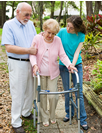Getting Help from Family, Friends and Community

Caregiving is a lot of work. Help is available. You are not alone in caring for your loved one. Your loved one is important and so are you. Family, friends and community volunteers want to help. You just need to ask.
What Do You Need to Know?
Caregiving can be a full-time job. Make a list of what tasks you need and who you can ask. Here are ways others can help:
- Household chores, such as cooking meals, washing the laundry, house-cleaning, house repair and lawn care
- Other help, such as transportation to medical visits, shopping and gathering information on services and financial assistance.
- Social visits. Remind others that your loved one enjoys friendly visits. During these visits you can get a short break. Think about going shopping or having lunch with a friend.
Why Is It Important to Get Help from Family and Friends?
Family, friends and community volunteers can help you give better care. This is important because:
- Sharing the work will help you keep your loved one at home.
- Getting support will help you take care of yourself.
- Everyone feels part of the family when they can help. Give them a chance.
Ask For the Help You Need
Ask your loved one how they feel about getting help from others. Your loved one has the right to be involved. Be sure your loved one is comfortable with the people who help. Be clear and ask for what you need. Tell each person who helps how the stroke affected your loved one.
How Do You Find Volunteers in the Community?
Contact your church, local community or senior center, or local Veterans organization. Also, contact these agencies and ask for local volunteers. The Resources section has contact information.
- Social worker in the local VA hospital
- Local Area Agency on Aging
- The Family Care Navigator
How Do You Plan for Emergencies Before You Need Help?
- Keep a list of phone numbers of people who can help.
- Plan who can help with different emergency needs. Who can take your loved one to the hospital? Who can pick up medicines late at night? Who could stay with your loved one during an illness?
- Prepare an emergency kit that has medicines, clothes and special foods. Also, include a list of care instructions about your loved one.
Helpful Tips
- Have a meeting with your family, friends and volunteers. Work together to get the best help for your loved one.
- Realize that asking for help may be hard for you.
- Say “thank you” to each person who helps − it's the best reward.
- Screen people before hiring them. Check at least two references before hiring anyone who does not work for an agency.
Remember
- Sharing the work will help you keep your loved one at home.
- Your well being is important, too. Ask for help. You will find that family, friends and others want to help.
More Resources 
Additional credible resources on this topic can be found here. Website pages may change or update, therefore if a link does not work, you may also try to type the information into your internet search bar. This Resource List will be updated frequently.
|
*Link Disclaimer: Links to information and Web sites outside of the Department of Veterans Affairs do not indicate an endorsement of products or services offered by the sites. In addition, these sites may have privacy and security policies that are inconsistent with those of VA. |
References: Family Caregiver Alliance. (2008). National Center on Caregiving. Retrieved December 9, 2008, from: http://www.caregiver.org/caregiver/jsp/content_node.jsp?nodeid=407; National Family Caregivers Association and National Alliance for Caregiving. (2004). Family Caregiving 101. Retrieved December 9, 2008, from: http://www.familycaregiving101.org/top_10/ (This resource is no longer available.)
These materials were created for the project:
Web-Based Informational Materials for Caregivers of Veterans Post-Stroke
Project Number SDP 06-327 funded by VA HSR&D Quality Enhancement Research Initiative (QUERI)



















